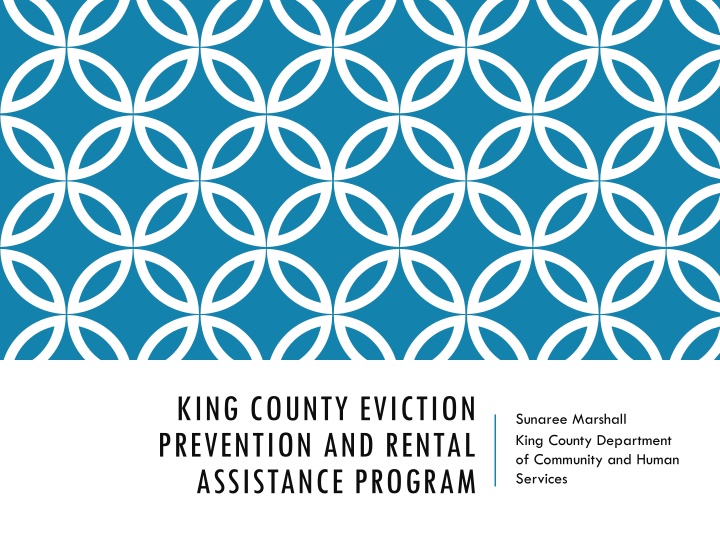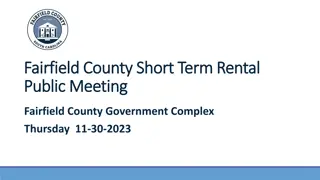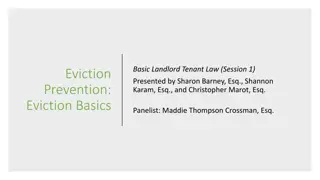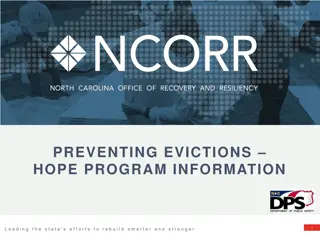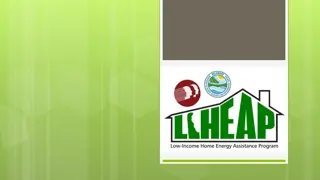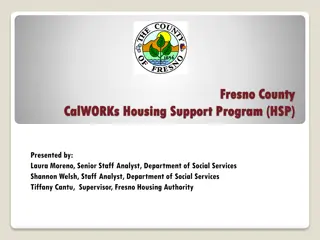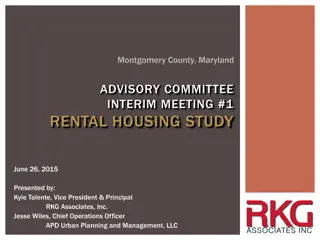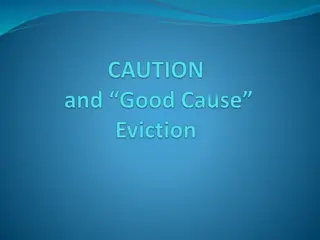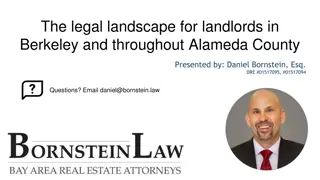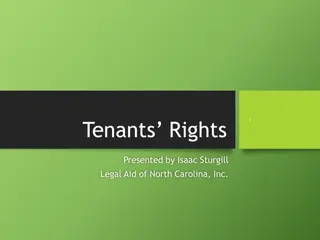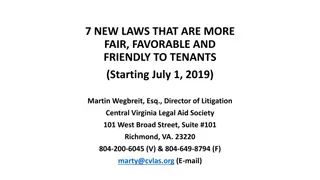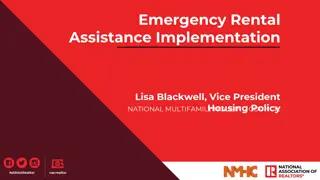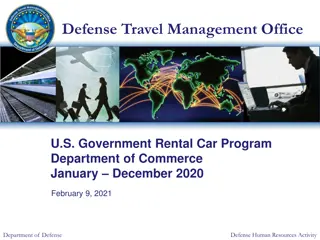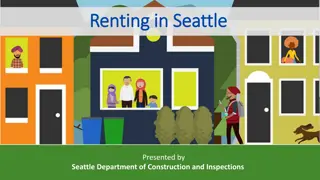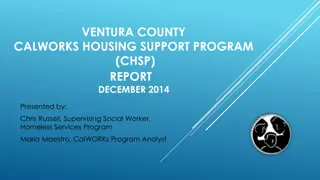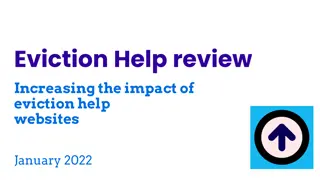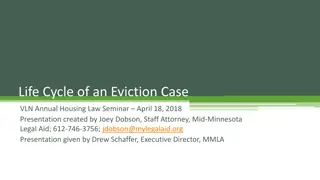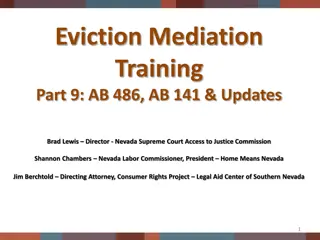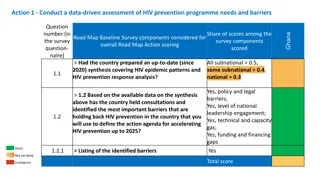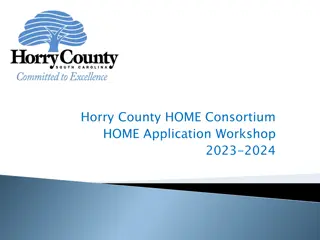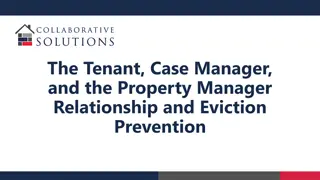King County Eviction Prevention & Rental Assistance Program Overview
The King County Eviction Prevention & Rental Assistance Program aims to help households at risk of eviction, especially due to COVID-19 impacts. The program focuses on preventing evictions, serving those likely to become homeless, and promoting equity in assistance distribution. Lessons learned include the need for centralized coordination and outreach resources. Eligibility criteria include income below 50% of the Area Median Income and unpaid rent since March 2020, with additional requirements for rent-burdened tenants, previously homeless individuals, or those facing housing disruptions due to discrimination. Funding sources, restrictions, and tenant eligibility criteria are detailed to ensure efficient allocation of resources.
Download Presentation

Please find below an Image/Link to download the presentation.
The content on the website is provided AS IS for your information and personal use only. It may not be sold, licensed, or shared on other websites without obtaining consent from the author.If you encounter any issues during the download, it is possible that the publisher has removed the file from their server.
You are allowed to download the files provided on this website for personal or commercial use, subject to the condition that they are used lawfully. All files are the property of their respective owners.
The content on the website is provided AS IS for your information and personal use only. It may not be sold, licensed, or shared on other websites without obtaining consent from the author.
E N D
Presentation Transcript
KING COUNTY EVICTION PREVENTION AND RENTAL ASSISTANCE PROGRAM Sunaree Marshall King County Department of Community and Human Services
THE NEED Need far outweighs resources King County DCHS estimates 58K households at risk of eviction Estimate based on number of rent-burdened households impacted by COVID-19 and of undocumented renters who have lost jobs (and do not qualify for unemployment) Resources available will likely support approximately 10K households Need is urgent Reports of households self-evicting, even with the moratorium
PROGRAM GOALS Prevent evictions Target limited resources to people most likely to become homeless after eviction Target limited resources to people most likely to suffer severe health consequences as a result of eviction Promote equity in who is served, with a focus on equity for groups of people who historically have not been provided equitable access to rent assistance and those disproportionately impacted by the COVID-19 outbreak.
LESSONS LEARNED TO DATE National Lack of Central Coordination Results in Months Long Backlog Local First Come First Served System Advantages Most Privileged Resources Needed for Outreach and Application Assistance In Language Materials Tenants Need Routine Status Update
RESOURCES & RESTRICTIONS Funding $9.8M King County CRF $28.7M Dept. of Commerce CRF $1.7 CDBG-CV $1.2 VSHSL $41.4M Total Restrictions Spend the CARES Act dollars by December 30, 2020 Prevent duplication of benefits Reimbursement based contracts CDBG-CV has additional criteria like COVID-19 impact and geographic limitations WA Department of Commerce set tenant eligibility and King County cannot change it
TENANT ELIGIBILITY Tenants must meet BOTH of the following eligibility requirements: Income is at or below 50% of the Area Median Income over the past 60 days; and At least one month of rent is not paid or partially unpaid since March 1, 2020. In addition, tenants must meet ONE or more of the following requirements: Rent-burdened: 50% or more of current monthly income is needed to pay rent. Previously homeless within last five years; includes experiences of couch surfing/doubled up. Eviction history within last seven years. Housing disrupted due to household member race, ethnicity, gender identity, sexual orientation, or religion. At risk of severe illness as per the Centers for Disease Control: 62 years old or older, underlying health condition. Disability of any household member. Includes a physical, developmental, mental, or emotional impairment, including impairment caused by alcohol or drug abuse, post-traumatic stress disorder, or brain injury. A person with HIV/AIDS is considered disabled.
LANDLORD CONDITIONS As a condition of receiving funding, landlords must agree to: 1. Accept three months of rental assistance on behalf of the participating tenant at the lesser of either (a) 80 percent of the otherwise applicable total rent for three months; or (b) fair market rent for the three months. Any rental debt owed by the tenant for more than three months must be forgiven. If rental debt is less than three months, assistance may be paid for past due and current rent up to three months not to extend beyond December 2020. 2. Not terminate or refuse to renew the participating tenant s tenancy absent good-cause until March 31, 2021. 3. Not raise rent on current tenant(s) served by this program until March 31, 2021. Tenancies using Section 8 vouchers are exempted from the no rent increases conditions if the rent increase is based on an increase in the tenant s income. NOTE: If landlord does not agree to conditions, the household will not be served.
THE DOORS INTO THE PROCESS 1. Landlord Doors Large Landlord Fund & Manufactured Park Fund Small Landlord Lottery 2. Tenant Door - Tenant Lottery NOTE: Landlords will NOT screen tenants; they will only know that a tenant is behind in rent and how much they owe. Nonprofit agencies will screen tenants with an application. Landlords will NOT know why a tenant is/is not served.
LARGE RESIDENTIAL LANDLORD FUND Pays participating landlords in bulk for every eligible tenant behind in rent Large landlord has 10 or more tenants behind in rent and meets ONE of the follow eligibility criteria: Any publicly subsidized property located in King County OR Located in a high-needs zip code Over 200 large landlords have submitted interest to participate in this fund, representing approximately 4,000 households
MANUFACTURED HOUSING PARK FUND Pays participating park owners in bulk for every eligible tenant behind in rent Any manufactured park owner in King County can participate Five properties have submitted interest so far
SMALL LANDLORD / TENANT FUND Tenants All tenants countywide eligible for lottery Referrals will be made weekly to non-profits meeting tenant demographic and linguistic needs Over 4,000 tenants have submitted interest Small Landlords All small landlords countywide (those with 9 or fewer tenants behind in rent) eligible for lottery If small landlord selected, all tenants behind in rent will be screened Referrals made on nonprofit capacity to pay bulk payment to small landlords Over 100 small landlords have submitted interest, averaging 2 units a landlord Lottery Runs on a Weekly Basis People not selected will be alerted via email every Friday
LANGUAGE ACCESS AND OTHER CONSIDERATIONS General Access Spreading program info through media, listservs, and membership-based organizations Language Translating all materials, including materials used by CBOs Prioritizing contracting with CBOs with language ability Technology CBOs will manage phone line for tenants to call if they can t fill out form themselves Prioritizing contracting with CBOs who can overcome tech barriers
GRIEVANCE PROCESS Any tenant denied assistance can appeal decision to DCHS Tenant has option to get help from Housing Justice Project Appeal must be filed within two weeks of denial Purpose is to catch mistaken denials. However, if a landlord refuses to accept conditions, the household cannot be served
PROGRAM TIMELINE Contracting Contracting underway, with the Outreach and Application Assistance and Large Residential Landlord Fund agencies launching first Lottery Lottery began on September 14, 2020, and continue weekly until funds run out Review Review of program will happen in early October, with DCHS ready to make program adjustments as necessary
FOR MORE INFORMATION www.kingcounty.gov/covid/rent
HOW DOES THE LOTTERY WORK? On a weekly basis King County staff will create the lottery pool from all tenant interest forms that have been received Households already served by program and ineligible households will be removed King County staff will then run a randomized lottery The number of tenants selected each week will be determined by the capacity of nonprofit agencies to serve tenants that week Tenants not selected will be emailed every Friday about their status Selected tenants will be contacted by the nonprofit agency to complete their application Tenants not selected in lottery will remain in the lottery each week until the funds run out Selected tenants will be sent to a nonprofit agency to process their application Referrals will be made based on the capacity of the agency and needs of the tenant (such as language need)
WHY A LOTTERY? WHY DO TENANTS STAY IN LOTTERY EVERY WEEK UNLESS THEY ARE SELECTED? Estimate of 60,000 households in need of services, but funding only serves 10,000 households Lottery prevents only serving tenants with the fewest barriers Weekly lottery gives tenants more time to access funds, even if they do not learn about this opportunity for several weeks Will contract with community-based organizations to overcome tech and language barriers
WHAT IS 50% AMI (AREA MEDIAN INCOME) OVER THE PAST 60 DAYS? Over the past 60 days, your income must have been at or below the following, based on your household size:
DO TENANTS NEED TO PROVIDE DOCUMENTATION TO PROVE THEIR ELIGIBILITY? NO. A tenant will be asked to provide income documentation, but if they do not have it, they can self-certify their income eligibility. Tenants will not be asked to provide any documentation to prove the secondary criteria.
DOES THE TENANT HAVE TO ASK THEIR LANDLORD IF THE LANDLORD WILL AGREE TO CONDITIONS? WHO DOES THIS? NO. After a tenant has been found to be eligible by a nonprofit agency, the nonprofit agency will contact the landlord to discuss the program and get their agreement. If tenants feel comfortable, alerting their landlord to the program once the tenant is selected from the lottery might help ensure applications are processed quicker, but it is not necessary. If the landlord does not accept the conditions, the tenant will not be served.
HOW WILL THE LANDLORD CONDITIONS BE ENFORCED? Landlords will sign an agreement stating they agree to the landlord conditions and that the tenant has been made current in rent. This agreement can be enforced in court by the tenant if necessary.
WHAT IS GOOD CAUSE? A participating landlord may only terminate or refuse to renew a tenancy for one of the below reasons until March 31, 2021: A household member materially violates the terms of the lease (including, among other reasons, nonpayment of rent after the tenant is served by the program) A household member is creating a significant and immediate risk to the health, safety, or property of others; or At least 60 days written termination notice is provided to the household based on the Landlords intent to (i) personally occupy the premises as a primary residence, or (ii) sell the property. The landlord agreement does not supersede local, state, or federal laws or orders that provide tenants further protections
WILL PAYMENTS BE MADE TO THE TENANT OR TO THE LANDLORD? All payments will be made directly to the landlord, not the tenant. Landlords will be required to sign a contract agreeing to the terms of the program for every tenant served in the program. Tenants will receive a copy of this agreement. Paying tenants directly would be difficult with the constraints on the funding. In addition, it would not be possible to require landlords to agree to the landlord conditions if they were not paid directly.
RESOURCES Questions about EPRAP? Email commerceRAgrant@kingcounty.gov Other resources: Washington state eviction moratorium Attorney General eviction moratorium complaint form Centers for Disease Control and Prevention eviction moratorium Housing Justice Project: free legal aid, call (206) 267-7069 or go to www.housingjusticeproject.org
